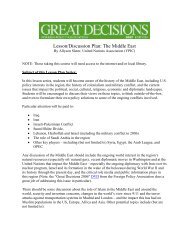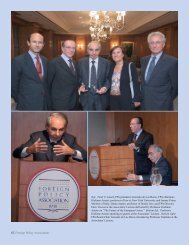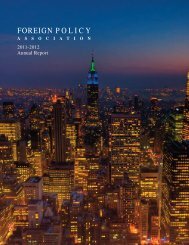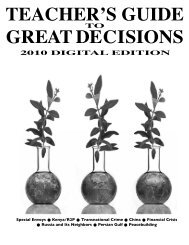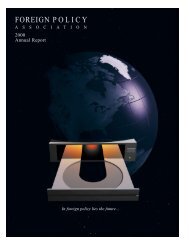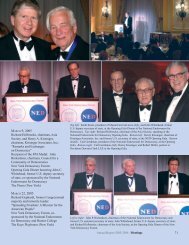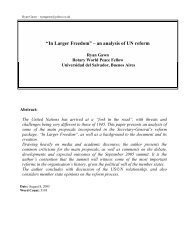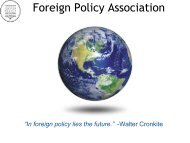Celebrating 90 Years - Foreign Policy Association
Celebrating 90 Years - Foreign Policy Association
Celebrating 90 Years - Foreign Policy Association
You also want an ePaper? Increase the reach of your titles
YUMPU automatically turns print PDFs into web optimized ePapers that Google loves.
In looking for inspiration on the subject of<br />
diplomacy, I came upon the end of “The Good,<br />
the Bad and the Ugly.” After the buried treasure<br />
is found in the graveyard, Clint Eastwood<br />
says, “There are two sorts of people in this<br />
world: those with a loaded gun, and those who<br />
dig. You dig.” There are two types of diplomats<br />
in the world as well. There are those who sit in<br />
pleasant ministries or international organizations<br />
writing the rules and deciding the policies,<br />
and there are those who are sent out on<br />
the streets to apply the rules to real life. I have<br />
been lucky enough to do both. I have helped<br />
write rules of global order in London, in Washington,<br />
in Brussels, and now in New York. And I<br />
have also worked on the ground in Syria, South<br />
Africa, Egypt, and Iraq, trying to bring about<br />
change in real life.<br />
A most memorable moment of my career<br />
was out in the field, in Cape Town, on 12 February<br />
19<strong>90</strong>. I had been with our embassy in<br />
South Africa for two years, and I was in the garden<br />
of Archbishop Tutu’s house that morning.<br />
It was the day after Nelson Mandela had been<br />
released, and there he was, just a few yards<br />
away from me, giving his first press conference<br />
after 27 years in prison. There was an invited<br />
audience of twenty or so South African journalists<br />
and a handful of young diplomats who<br />
had heard about the press conference and had<br />
worked their way in. I had the honor of greeting<br />
Nelson Mandela to freedom on behalf of<br />
the British people, and he asked me to convey<br />
a personal message to Margaret Thatcher, who<br />
was then Prime Minister. It was an unforgettable<br />
moment for a young diplomat.<br />
Nelson Mandela’s release and<br />
the transformation of South<br />
Africa that it heralded, together<br />
with the collapse of communism<br />
in Eastern Europe, which hap-<br />
pened at the same time, showed<br />
me that change is possible.<br />
Mandela’s release and the transformation<br />
of South Africa that it heralded, together with<br />
the collapse of communism in Eastern Europe,<br />
which happened at the same time, showed<br />
me that change is possible. It was change not<br />
from revolutionary terror or violent upheaval or<br />
military force, but change through democratic<br />
process and with restraint as an end in itself. It<br />
was change supported by patient diplomacy,<br />
by winning the arguments, and by judiciously<br />
applying pressure and incentives. Such change<br />
showed me that diplomacy can work. It was<br />
one of the best moments in my life.<br />
The worst moment in my career came<br />
over Easter weekend in 1999. I was a new<br />
recruit to Tony Blair’s team on Downing Street,<br />
advising him on foreign policy. Two weeks<br />
earlier, NATO forces had begun bombing<br />
Milosevic’s Serbia. Our policy had, we believed,<br />
been thought through well. We had built up<br />
the pressure over the previous months, but<br />
Slobodan Milosevic had refused to deal with<br />
the Kosovo issue in a reasonable way. We had<br />
FOREIGN POLICY ASSOCIATION | 93<br />
MEETINGS: PRESENTATION BY SIR JOHN SAWERS




